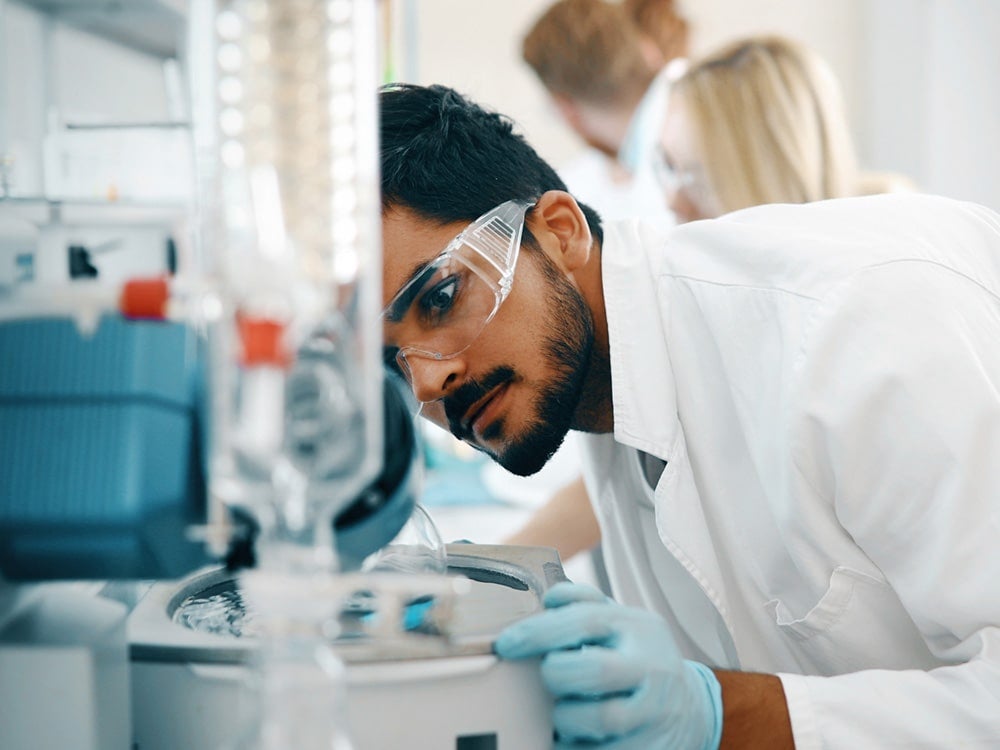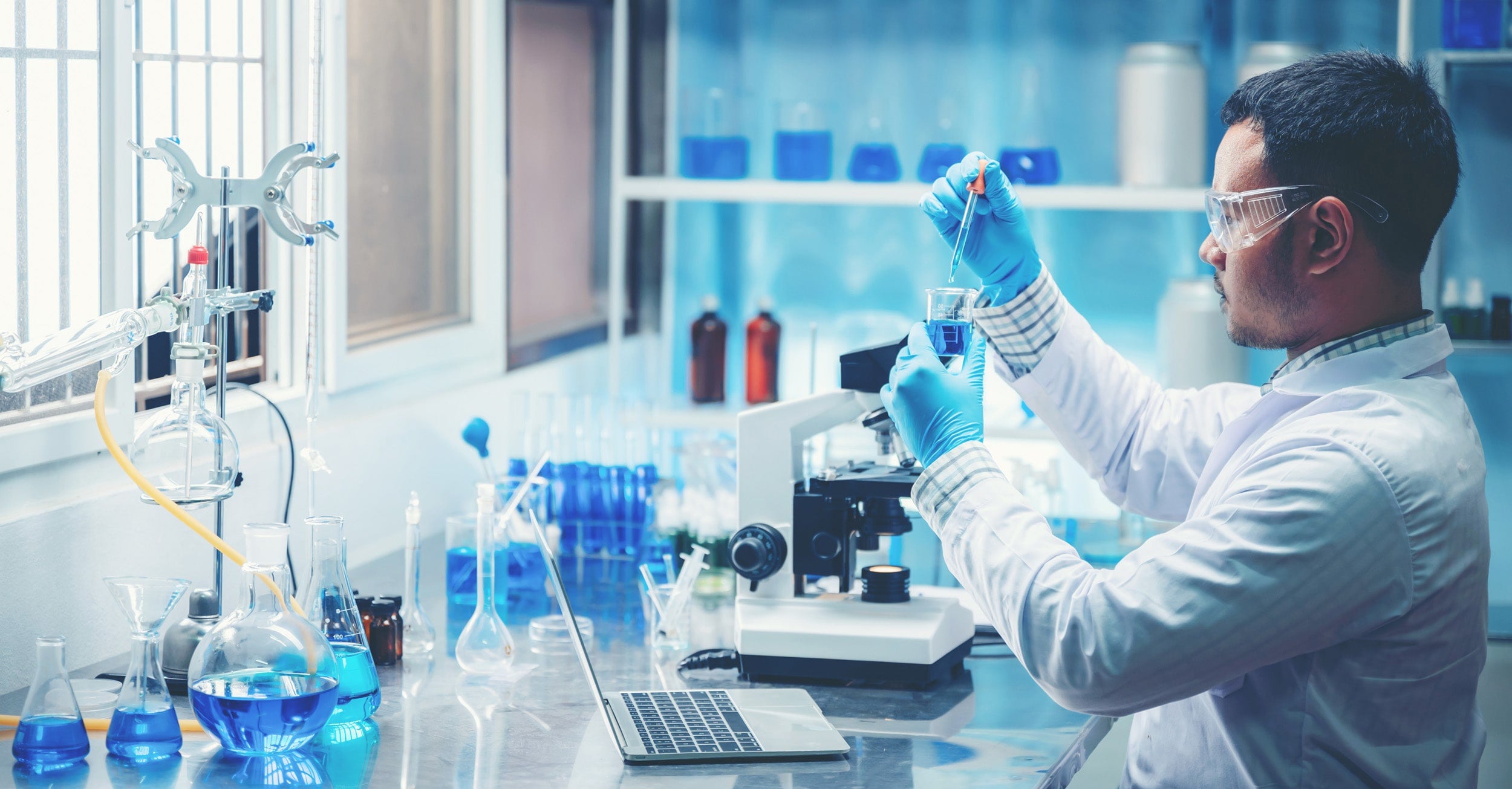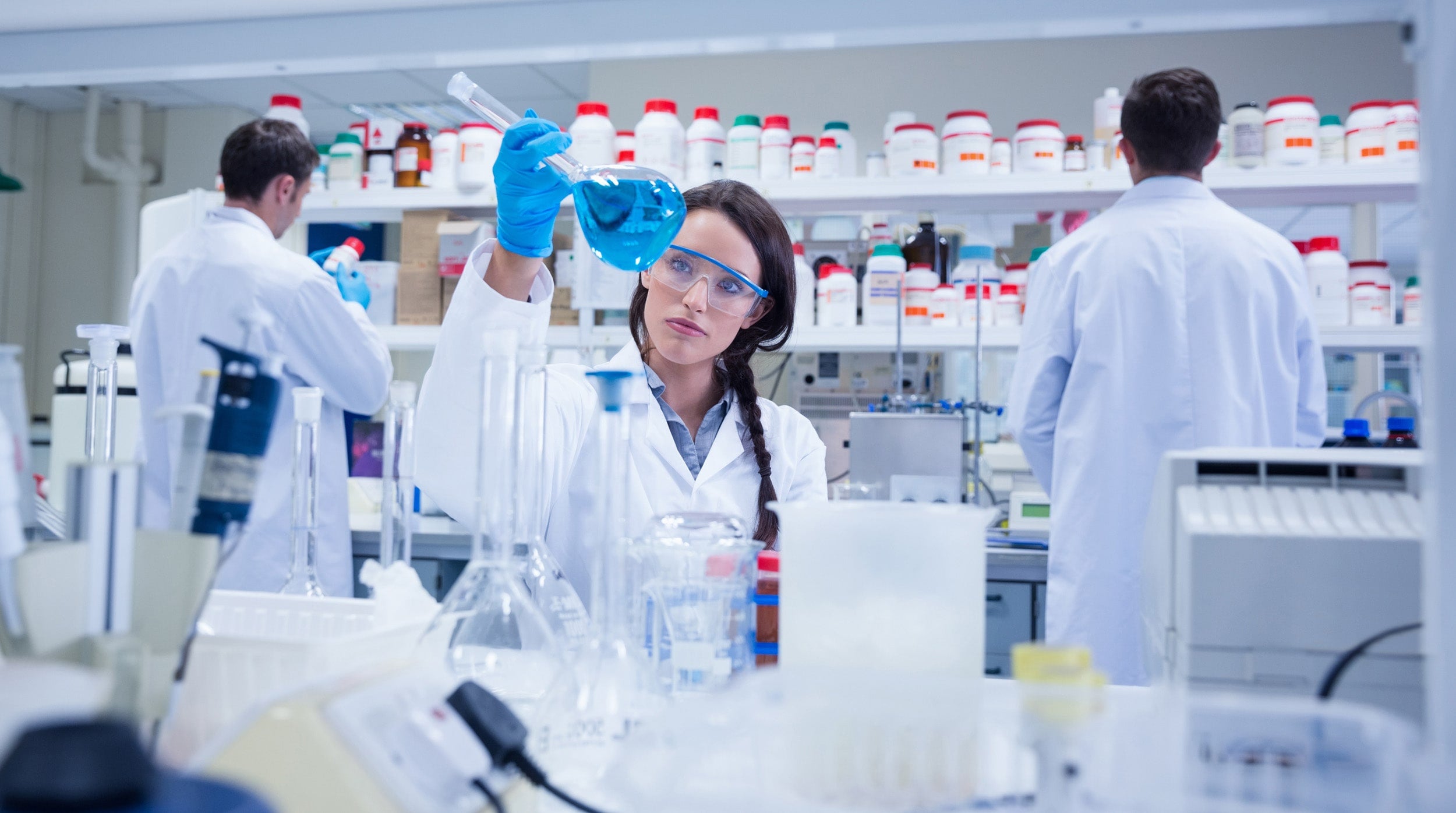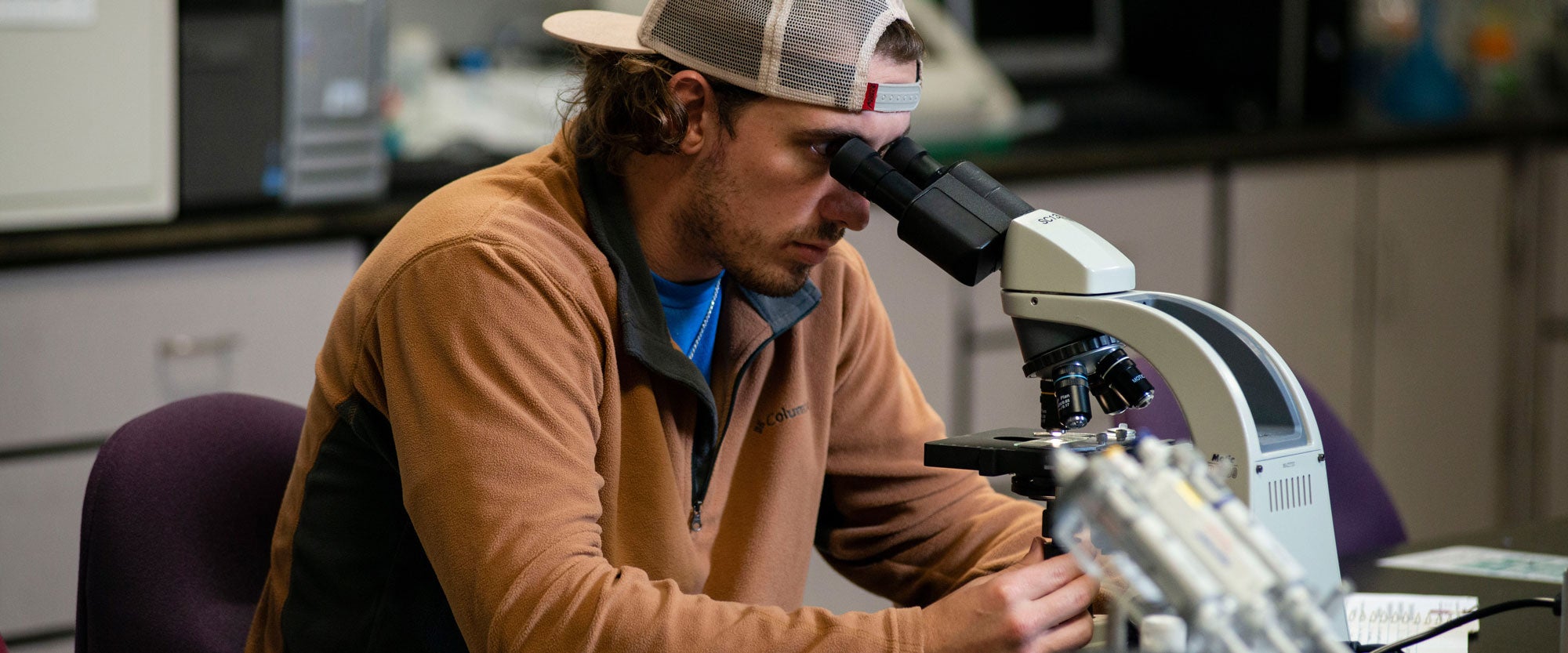Delve into the properties of molecules and materials and discover what drives the most exciting and revolutionary technology in modern medicine, pharmacology, and environmental science.
Locations
- Statesboro Campus (In Person)
- Armstrong Campus (In Person)
Why Major in Chemistry at Georgia Southern?
- Develop your critical thinking skill by participating in real-world research.
- Learn modern lab methods while using state-of-the-art equipment.
- Lay the foundation for an advanced degree in chemistry or medicine.
- Be part of a program certified by the American Chemical Society.
- Pursue a fulfilling and challenging career as a chemist in a governmental or industrial laboratory.
A chemistry degree at Georgia Southern prepares you not only for work in cutting-edge technical fields, but also develops and hones your skills in critical thinking, problem solving, and discovery.
You’ll work alongside nationally-recognized faculty doing real-world research as you learn about the fundamental building blocks of our world—research that frequently opens up internship opportunities with industrial partners, government labs or other universities that can result in co-authored publications.
All this is excellent preparation for professional work in a variety of industries, an advanced degree, or a career in teaching and academic research.
Ready to Apply?
What Can You Do With a Chemistry Degree?
Given that chemistry and molecular science are fundamental to many modern technologies our chemists face a host of opportunities in medicine, pharmacology, environmental science and engineering.
Where our graduates work:
- SNF Holding Company
- Coram CVS / Specialty Infusion Services
- EMD Electronics
- Gulfstream Aerospace
- BASF
- Centers for Disease Control and Prevention
- Eli Lilly and Company
- Kraton Corporation
- Alcon
- CVS Health
- ALS
- Amazon
What our graduates do:
- Jake DiCesare, BS Chemistry in Spring 2024 will continue his academic career at Purdue University. Jake will pursue a PhD in Analytical Chemistry in the Department of Chemistry at Purdue.
- John (Jack) Johnson, BS Chemistry in Spring 2023 from Georgia Southern. He joined the University of Georgia to continue his PhD degree under the guidance of Dr. Gregory Robinson (UGA Foundation Professor). Jack works on “Low-oxidation state main group element-based dithiolene complexes”
What You’ll Learn
As a chemistry major, you will become familiar with modern laboratory methods and applied techniques using state-of-the-art equipment.
Students who pursue the B.S. in Chemistry receive a quantitative experience in chemistry, while a Concentration in Biochemistry offers students a more significant foundation in the principles of biochemistry.
Students will learn:
- The principles of atomic and molecular structure to predict chemical properties and chemical reactivity.
- How to perform, design, interpret and document lab experiments.
- How to interpret and analyze quantitative data.
- Key principles of biochemistry (for students with a concentration in biochemistry).
- How to understand, use and interpret instruments commonly used in chemistry
Build Your Experience
Chemistry majors put their curiosity and skills to work long before they graduate. Get involved with cutting-edge research at the Center for Advanced Materials Science, through our undergraduate research program, or through the CEMITURE program that facilitates collaborative research in both the US and France.

Get Involved
Meet like minded students by joining one of our student groups, like the National Organization of Professional Advancement of Black Chemists and Chemical Engineers, the Student Affiliates of the American Chemical Society, or Alpha Chi Sigma—a professional fraternity with more than 63,000 members across the country.
Live and breath chemistry by becoming part of a Residential Learning Community, or get academic guidance from the COSM Advisement Center.

Minor in Chemistry
The Chemistry Minor is an excellent fit for those interested in the chemical sciences but who wish to pursue a different undergraduate major. The minor program requires 15 credit hours of chemistry coursework.
Take Action
Follow these steps to complete the Georgia Southern application:
- Create an application account.
- Complete our online application using the PIN you received after creating your application account.
- Once complete, pay the $30 application fee or upload a valid fee waiver. Previous Georgia Southern applicants and dual-enrollment students do not need to pay the fee.
You can check your application status at My.GeorgiaSouthern.edu/admissions three days after completing your application. This page contains live information about your admission status, including a checklist of missing documents we need to make a decision.
Apply as a First-Year Student Transfer to Georgia SouthernOur B.S. in Chemistry is accredited by the American Chemical Society
Earn a terminal professional degree and gain real-world experience in applying physical science to the business, government, and nonprofit sectors and choose a concentration in environmental science, material science or pharmaceutical science.
Start preparing now for a degree in chemistry by utilizing resources targeted to high school students like Pearson’s MyLab.
See what post-graduate opportunities are available through the National Conference on Undergraduate Research.
Find a variety of resources for planning your career from our Office of Career and Professional Development or check out the American Chemical Society’s Career Resources.
View a helpful interactive outline of the 4-year Chemistry curriculum.
All of these programs are designed to introduce the students to modern laboratory methods and principles using state-of-the-art scientific equipment. Undergraduate students are exposed to applied laboratory techniques, critical thinking, independent and team learning, and are provided with research opportunities. The faculty is committed to providing an environment that addresses the individual needs of each student and encourages them to develop their potential.
The Bachelor of Science in Chemistry programs offer students a more quantitative experience in chemistry. The Concentration in Biochemistry offers students a more significant foundation in the principles of biochemistry.
Program Learning Outcomes
- PLO1. Theory and Knowledge: Upon completion of the organic chemistry sequence, chemistry majors are able to recognize and apply the principles of atomic and molecular structure to predict chemical properties and chemical reactivity.
- PLO2. Laboratory Skills: Upon completion of a degree, chemistry majors are able to employ critical thinking and scientific inquiry in the performance, design, interpretation and documentation of laboratory experiments, at a level suitable to succeed at an entry-level position in the chemical industry or a chemistry graduate program.
- PLO3. Quantitative Skills: Upon completion of a chemistry degree, chemistry majors are able to interpret and analyze quantitative data.
- PLO5. Biochemistry: Upon completion of a chemistry degree with a biochemistry concentration, students will recognize and apply key principles of biochemistry.
- PLO4. Instrumentation: Upon completion of a BS in Chemistry degree, students are able to understand theoretical concepts of instruments that are commonly used in most chemistry fields as well as interpret and use data generated in instrumental chemical analyses.
Student Feature
David Denemark has been named a 2024 Mayfield Scholar. David is currently a junior Biochemistry major and working in the Center for Advanced Materials Science at Georgia Southern University with Dr. Ji Wu. He has been working on the synthesis of flexible electrodes for wearable, high capacity lithium/sodium ion batteries using creative nanotechnology during this summer. Preliminary data indicates the electrodes have excellent electrochemical and mechanical properties. He is currently making efforts to optimize the characteristics of these flexible electrodes for potential commercial applications. The Mayfield Scholarship is designed to support outstanding Biochemistry or Chemistry majors at Georgia Southern in their research projects during the summer term.
See More Student Work
Faculty Feature
Dr. Rafael Quirino and his students visit France for research collaborations. Dr. Quirino is currently in Epinal (France) to wrap-up the activities of his NSF-IRES grant. Since 2021, this grant supported a total of 13 US undergraduate and graduate students doing research on wood torrefaction in a collaborative effort between the University of Lorraine (France) and Georgia Southern University. Overall, the initiative led by Dr. Quirino (PI) and Dr. Aiken (co-PI) resulted in 4 oral presentations and 8 posters presented in National and International Scientific Meetings with student co-authors, 7 peer-reviewed publications, with student co-authors, in prestigious journals, such as Fuel (IF = 7.4), Wood Material Science and Engineering (IF = 2.2), Fibers (IF = 3.9), Environmental Technology and Innovation (IF = 7.1), Applied Energy (IF = 11.4), and Environmental Pollution (IF = 10.0).
Learn More About Our Faculty

Take the Next Step
Explore our intricate and incredible world at the atomic level. Learn more about our chemistry program today.
Contact Us
Department of Biochemistry, Chemistry and Physics
P.O. Box 8064
Statesboro, GA 30460
Phone: 912-478-5681
Fax: 912-478-0699
bcp@georgiasouthern.edu




